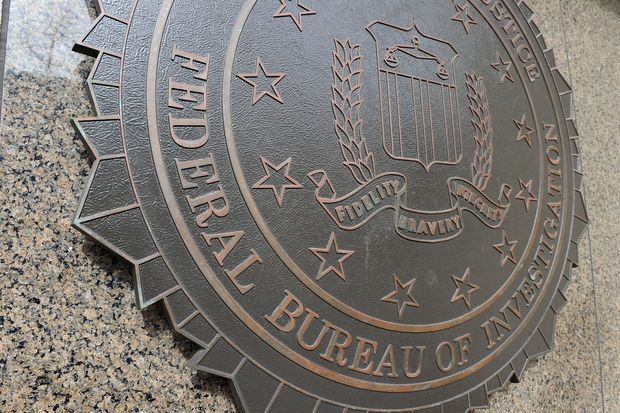
The bureau relied on a suspected Russian agent for its 2016 wiretaps.
General view of the J. Edgar Hoover F.B.I. Building in Washington, D.C.
Photo: mary f. calvert/Reuters
It was worse than we thought. We’re referring to the FBI’s 2016 investigation into the Trump campaign and Russia, as new documents this week reveal.
Senate Judiciary Chairman Lindsey Graham on Thursday released newly declassified FBI documents that contain this stunner: The bureau relied on a suspected Russian agent for the information it used to obtain a secret surveillance warrant against former Trump adviser Carter Page.
Four years into accusations about Russia-Trump collusion, we finally learn that Russia’s main conduit for disinformation may have been America’s FBI. Vladimir Putin must be howling with laughter.
***
Department of Justice Inspector General Michael Horowitz last year revealed that former spook Christopher Steele relied on one primary “subsource” for most of his accusations against the Trump campaign. This subsource was later identified as Ukrainian-born Igor Danchenko, who worked as a research analyst from 2005 to 2010 at the Brookings Institution in Washington. The latest disclosures show that Mr. Danchenko was the subject of an FBI counterintelligence investigation from 2009 to 2011, based on concerns he was a Russian agent and “a threat to national security.”
According to the documents, Mr. Danchenko attempted to recruit two individuals connected to “an influential foreign policy advisor in the Obama administration.” He said that if they “did get a job in the government and had access to classified information,” he had a way for them “to make a little extra money.”
Further FBI investigation found Mr. Danchenko was an associate of two other “FBI counterintelligence subjects.” He also had contact with “the Russian Embassy and known Russian intelligence officers,” and the FBI went so far as to apply for a warrant to surveil Mr. Danchenko. The investigation ended because he left the country in September 2010, though the FBI said “consideration would be given to re-opening the investigation” if he returned. A lawyer for Mr. Danchenko in July said his client “is a highly respected senior research analyst” who wasn’t responsible for writing or editing the Steele dossier.
Here’s the kicker: The FBI identified Mr. Danchenko as Mr. Steele’s source in December 2016, when senior bureau officials also became aware of the prior FBI investigation. The FBI’s realization that it was being fed potential Russian disinformation should have put an immediate halt to the Page probe, if not the entire collusion investigation.
Instead and incredibly, the FBI failed to disclose this information to the Foreign Intelligence Surveillance Court in all three of its subsequent renewal applications against Mr. Page. U.S. Attorney John Durham first brought the Danchenko information to Attorney General Bill Barr’s attention and said its public release would not interfere with his investigation.
In related news Thursday, the Justice Department disclosed more FBI text messages and notes in the tainted Michael Flynn case. These also reflect horribly on the James Comey-era FBI. Agents (names redacted) express dismay and disdain in the messages for the broader collusion investigation (code-named Crossfire Hurricane) and for the probe of Mr. Flynn.
In October 2016 internal messages, agents refer to the “Crossfire Road Show” and one says: “I’m tell [sic] man, if this thing ever gets FOIA’d, there are going to be some tough questions asked.” Another responds that the problem is “a scope way outside the boundaries of logic,” to which an agent says one team member is engaged in “rabbit holes and conspiracy theories.”
Agents questioned the use of national security letters (subpoenas that don’t require judicial permission) to get Mr. Flynn’s financial records. One series of messages is from Jan. 5, 2017, the same day Mr. Comey briefed Barack Obama, Joe Biden and Susan Rice on the Flynn/Trump investigations.
“[W]hat’s the word on how [Obama’s] briefing went?” asks one agent. “Don’t know, but people here are scrambling for info to support certain things and it’s a mad house.” A few days later, an FBI employee reports that they “all went and purchased professional liability insurance” over concerns about DOJ/FBI leaks and that “the new AG might have some questions.”
Justice also released a recent government interview of William Barnett, an FBI official who worked on the Crossfire investigation, and later for Special Counsel Robert Mueller. Mr. Barnett said the Flynn investigation was so “problematic” that in February 2017 he asked to be removed, for fear it would “result in an IG investigation.” He said he only reluctantly joined the Mueller team, hoping to protect against “group think.” He found a “get TRUMP” attitude among its members, and that one Mueller prosecutor in particular was “obsessed with Flynn” and “had an agenda.”
The process, he said, was upside down, with investigators treated as a “speed bump” by attorneys who “wanted to be part of something ‘big.’” These “all stars” called the shots, and “there was a lack of letting the evidence lead the investigation.” He closed the interview by saying he believed the Mueller team brought a charge that Mr. Flynn lied to the FBI as another “means to ‘get TRUMP.’”
***
All of this underscores that the great scandal of 2016 wasn’t Russian collusion. It was the unleashing of America’s premier law enforcement agency against a presidential campaign based on Russian disinformation midwifed and financed by the Clinton campaign. The public is finally getting the truth about the FBI’s malfeasance, and Messrs. Barr and Durham deserve credit for exposing it.

